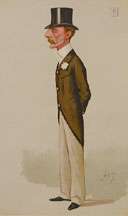Henry Meysey-Thompson, 1st Baron Knaresborough

Henry Meysey Meysey-Thompson, 1st Baron Knaresborough (30 August 1845 – 3 March 1929) was a Liberal (and later Liberal Unionist) politician who sat in the House of Commons variously between 1880 and 1905 when he was raised to the peerage as Baron Knaresborough.

Meysey-Thompson was born at Kirby Hall, near Great Ouseburn, North Yorkshire, the son of Sir Harry Meysey-Thompson, 1st Baronet and his wife Elizabeth Anne Croft, daughter of Sir John Croft, 1st Baronet. He was educated at Eton College and at Trinity College, Cambridge where he won his blue in athletics and was awarded BA in 1868. He became a private secretary to William Ewart Gladstone.[1] In 1874, he succeeded to the Meysey-Thompson baronetcy which had been created for his father less than two months earlier. He was a J.P. for the North and West Ridings of Yorkshire, and captain in the Yorkshire Hussars Yeoman Cavalry.[2]
At the 1880 general election Meysey-Thompson was elected Liberal Member of Parliament (MP) for Knaresborough, but his election was declared void on 23 July 1880.[3] In 1885 he stood for parliament unsuccessfully at North Lincolnshire.[2] At the 1885 general election he was elected MP for Brigg.[4] However, in 1886, as one of the MPs who opposed Gladstone's Irish Home Rule Bill, he joined the breakaway Liberal Unionist Party, but was not re-elected.
Meysey-Thompson was elected MP for Handsworth (on the outskirts of Birmingham), at the 1892 general election and held that seat until he was ennobled on 26 December 1905 as Baron Knaresborough, of Kirkby Hall in the County of York.[5][6]
Lord Knaresborough was chairman of the North Eastern Railway from 1912 to 1922. He died in London at the age of 83.[1]
Meysey-Thompson married Ethel Adeline Pottinger, daughter of Sir Henry Pottinger, 3rd Baronet in 1885.[2] Their son Claude died in 1915 at Ypres from wounds received in action in World War I. The peerage became extinct on the death of Lord Knaresborough in 1929 but the baronetcy passed to a nephew.[1]
His brothers, Albert and Charles won the FA Cup with the Wanderers in 1872 and 1873 respectively.[7]
References
- 1 2 3 "Meysey-Thompson, Henry Meysey (THM863HM)". A Cambridge Alumni Database. University of Cambridge.
- 1 2 3 Debretts House of Commons and the Judicial Bench 1886
- ↑ Leigh Rayment's Historical List of MPs – Constituencies beginning with "K" (part 2)
- ↑ Leigh Rayment's Historical List of MPs – Constituencies beginning with "B" (part 5)
- ↑ The London Gazette: no. 27871. p. 107. 5 January 1906.
- ↑ Leigh Rayment's Historical List of MPs – Constituencies beginning with "H" (part 1)
- ↑ Warsop, Keith (2004). The Early FA Cup Finals and the Southern Amateurs. SoccerData. p. 129. ISBN 1-899468-78-1.
- Lundy, Darryl. "Sir Henry Meysey Meysey-Thompson". The Peerage. p. 1887 § 18867. External link in
|publisher=(help) - Lundy, Darryl. "Captain Claude Henry Meysey Meysey-Thompson". The Peerage. External link in
|publisher=(help)
External links
- Hansard 1803–2005: contributions in Parliament by Henry Meysey-Thompson
- Portraits of Henry Meysey-Thompson, 1st Baron Knaresborough at the National Portrait Gallery, London
| Parliament of the United Kingdom | ||
|---|---|---|
| Preceded by Basil Thomas Woodd |
Member of Parliament for Knaresborough 1880–1881 |
Succeeded by Thomas Collins |
| New constituency | Member of Parliament for Brigg 1885–1886 |
Succeeded by Samuel Danks Waddy |
| Preceded by Henry Samuel Wiggin |
Member of Parliament for Handsworth 1892–1905 |
Succeeded by Ernest Meysey-Thompson |
| Baronetage of the United Kingdom | ||
| Preceded by Harry Stephen Meysey-Thompson |
Baronet of Kirby Hall, Yorkshire 1874–1929 |
Succeeded by Algar de Clifford Charles Meysey-Thompson |
| Peerage of the United Kingdom | ||
| New creation | Baron Knaresborough 1905–1929 |
Extinct |
| Business positions | ||
| Preceded by John Lloyd Wharton |
Chairman of the North Eastern Railway 1912–1922 |
Succeeded by William Whitelaw as Chairman, London and North Eastern Railway |